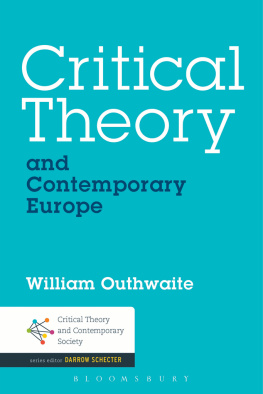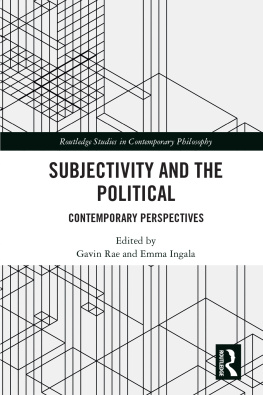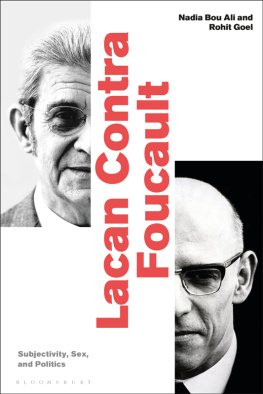Rethinking the Subject
Rethinking the Subject
An Anthology of Contemporary European Social Thought
Edited by
James D. Faubion
Rice University
Foreword by
Paul Rabinow
First published 1995 by Westview Press
Published 2018 by Routledge
711 Third Avenue, New York, NY 10017, USA
2 Park Square, Milton Park, Abingdon, Oxon OX14 4RN
Routledge is an imprint of the Taylor & Francis Group, an informa business
Copyright 1995 Taylor & Francis
All rights reserved. No part of this book may be reprinted or reproduced or utilised in any form or by any electronic, mechanical, or other means, now known or hereafter invented, including photocopying and recording, or in any information storage or retrieval system, without permission in writing from the publishers.
Notice:
Product or corporate names may be trademarks or registered trademarks, and are used only for identification and explanation without intent to infringe.
Library of Congress Cataloging-in-Publication Data
Rethinking the subject: an anthology of contemporary European social
thought/edited and introduced by James D. Faubion; foreword by
Paul Rabinow.
p. cm.
Includes bibliographical references and index.
ISBN 0-8133-1581-6 ISBN 0-8133-1582-4 (pbk)
1. Social sciencesPhilosophy. 2. Social sciencesEurope
Philosophy. 3. Subject (Philosophy) I. Faubion, James D., 1957
H61.R467 1995
300'.94dc20 94-27734
CIP
ISBN 13: 978-0-8133-1582-9 (pbk)
Contents
, Pierre Bourdieu
, Marilyn Strathern
, Michel Foucault
, Alessandro Pizzorno
Hans Blumenberg
, Reinhart Koselleck
, Louis Dumont
, Alan Macfarlane
, Niklas Luhmann
, Jurgen Habermas
, Jean-Franois Lyotard
, Alain Touraine
, Jean Baudrillard
Guide
The most striking achievement of this anthology is James Faubion's ability to observe, calmly and with a concerned attentiveness, the European field of social thought from afar, a gaze legitimated and made possible by his detailed familiarity with the terrain. He has performed the basic move of contemporary anthropologyparticipant observationand performed it with a sure-handedness that is quite striking. This ethnographic skill is the product of his background training in continental philosophy, analytic philosophy, literature, and cultural anthropology; the arts of the latter discipline practiced in Faubion's field site in Greece, not on the "culture" of a peasant village or provincial town, but in Athens among the elite. In sum, our editor has been observing the high theorists of Europe from multiple sites and for quite some time now. The theorists' imperium looks different from Athens, where it has been willingly taken up, valued, and internalized with a persistent if pianissimo stiffening of the cultural back, one quite distinct from a more classic colonial situation in which the center of the imperium can be located in good faith as else-where. It also looks different from the United States, where again, though dominant, influential, compelling and pervasive, European high theory nonetheless seems to certain natives as much European as theory. Faubion's collection is the first I know of to handle this tradition of thought in such a manner: respectful but observant, close but oh so far; seen from afar, but oh so closely.
The second point to be made arises from Faubion's perspective, which is, I believe, equally "American" and anthropological. European social thought has been resolutely plural for a very long time indeed, no doubt since the "Greeks," that is, for as long as it has been theory. Yet for an equally long time its impetus, its animus, its highest attainment, has always been to achieve a point from which all the diversity can be brought under one encompassing stronghold, the theory. Pierre Bourdieu and Jurgen Habermas are only the latest to make the attempt, however brilliant, to encompass everything and everybody else (i.e., everyone, everywhere, is always really symbolic accumulators or communicators). The great exception to this game of theory is Michel Foucault in his Nietzschean guise, and even there Foucault had his time of temptation, his momentary Heideggeran turn (in the Archaeology of Knowledge and The Order of Things), to situate everyone else, a temptation he later overcame. Of course the fury of the theorists against one who would not produce total theories remains unabated, unquenched. But Foucault as well remained with the "subject game" that Faubion identifies for us as the main channel that European theorists have navigated these past two centuries.
This anthology, then, is one way to do what Pierre Bourdieu has called "fieldwork in philosophy," though obviously not the kind of fieldwork nor philosophy Bourdieu had in mind, that is, one in which he would be the object, not of his own magisterial pronouncements but of someone else's observations on his European Modernity. This respectful and learned reversal of perspective, it seems to me, is the main virtue and delicious irony of this anthology.
Paul Rabinow
I have made every effort to exercise, over the excerpts that follow, a very light editorial hand. I have limited deletions to brief passages, most of which simply refer to "the previous" or "the next chapter," a few of which pursue a parenthesis or tangent. I have corrected typographical errors and have favored American over British conventions of grammar and punctuation. My own comments, interspersed among the notes that follow each excerpt, are always marked with an abbreviated signature"[ed]." Some of the excerpts include translators' notes, also appropriately marked. I have standardized the form of all notes but have made very few changes in their content. Some notes accordingly offer considerably more bibliographic information than others. Astute readers should recognize soon enough that the variation is systematic and systematically rational.
James D. Faubion
, "Structures, Habitus, Practices," is reprinted from The Logic of Practice, by Pierre Bourdieu, translated by Richard Nice (Stanford, Cal.: Stanford University Press, 1990), pp. 52-65, with the permission of the publishers, Stanford University Press. 1989 Polity Press.
, "Gender and Identity in the New Guinea Highlands," is excerpted from Marilyn Strathern's Gender of the Gift: Problems with Women and Problems with Society in Melanesia (Berkeley, Cal.: University of California Press, 1988), pp. 53-65, 352-355. Copyright 1988 The Regents of the University of California. Reprinted with permission.
, "Discipline," is excerpted from Michel Foucault's Discipline and Punish: The Birth of the Prison, translated by A, Sheridan (New York: Vintage Books, 1979), pp. 215-28. Copyright 1975 by ditions Gallimard. English translation copyright 1977 by Alan Sheridan. Reprinted by permission of Georges Borchardt, Inc.
, "Politics Unbound," is excerpted from Alessandro Pizzorno's "Politics Unbound," in The Changing Boundaries of the Political, edited by C. Maier (Cambridge: Cambridge University Press, 1987), pp. 28-55, Reprinted with the permission of Cambridge University Press.
, "Progress Exposed as Fate?," is excerpted from Hans Blumenberg's The Legitimacy of the Modern Age, translated by R. M. Wallace (Cambridge: MIT Press, 1983), pp. 27-35. Copyright 1983 The MIT Press. Reprinted by permission.










